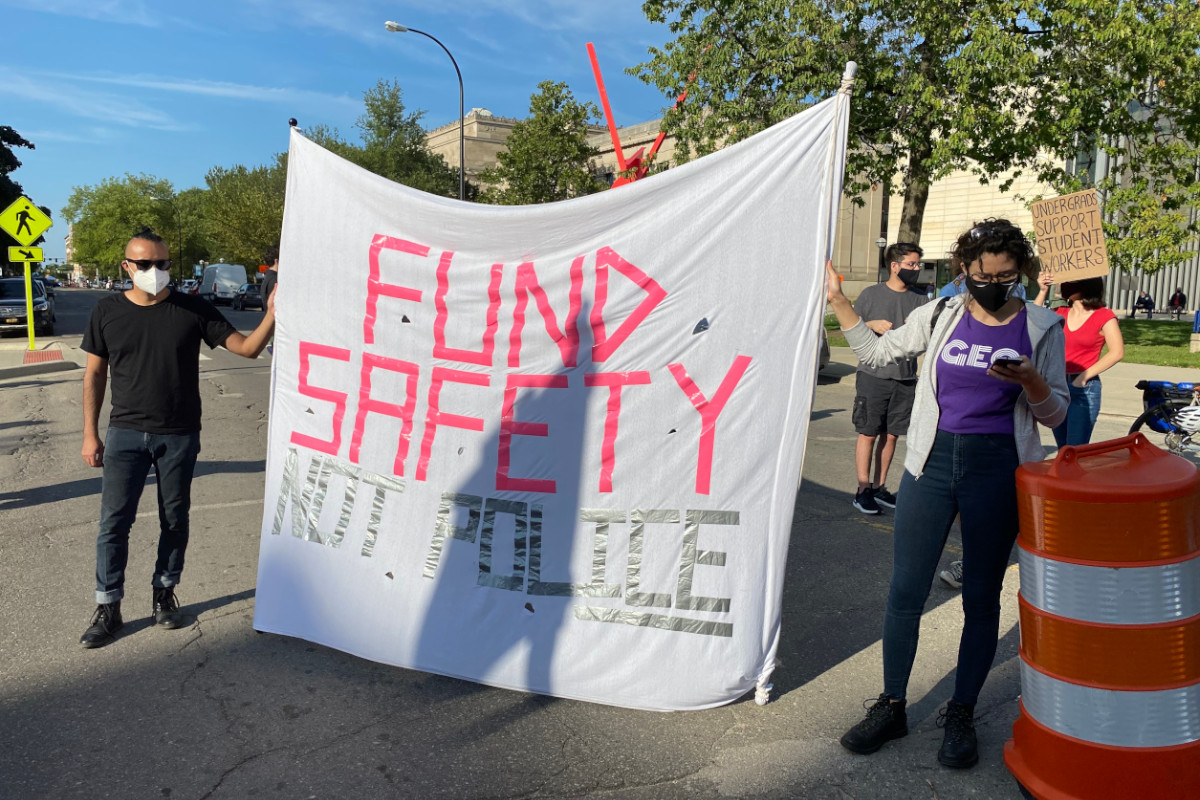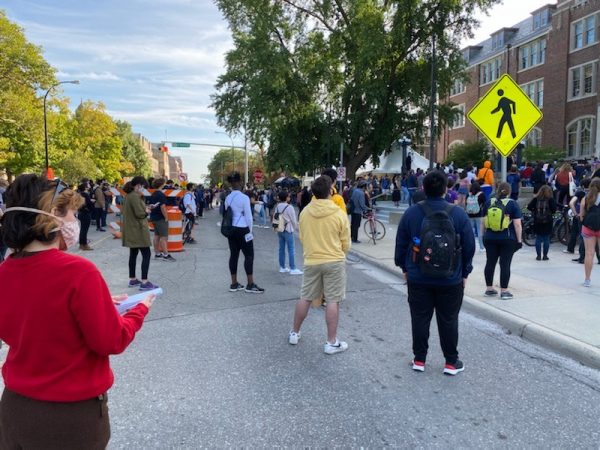
Protesters hold up signs while wearing masks. Xailia Claunch | Washtenaw Voice
By Cydney Heed
Staff Writer
Although the COVID-19 pandemic has put a stop to events, gatherings, and hangouts of all kinds this year, protests have continued.
Protesters, organizers, and community members alike have expressed concern about preventing the spread of the virus at protests and similar events.
“To be clear, the virus is circulating in the community, so any time you’re going to go out in public there’s a risk of exposure,” said Susan Ringer-Cerniglia, a spokesperson for the Washtenaw County Health Department. “What we would advise for going to a protest is not necessarily different than what we’re advising in any other setting.”
While many have expressed concerns that protests could lead to a surge in cases, Cerniglia noted that events that take place outdoors and make use of social distancing measures are not necessarily as dangerous as private gatherings where such measures are not observed.
“I think some of the confusion comes in when we talk about using these measures at something like a protest when there could be a large number of people. But they’re outside, they’re keeping a distance from one another, they’re using face coverings, and we don’t necessarily see transmission of illness, it’s very different from what we’ve been seeing at some of the social gatherings,” Cerniglia said.
Still, no gathering is risk-free. Those who have been exposed to COVID-19 or have pre-existing conditions are still advised to stay home.
“So, unfortunately, that does mean that people that are individually more vulnerable or may live with somebody and have regular contact with somebody that’s more vulnerable, really do need to take extra precautions,” Cerniglia said.

Protesters gather while maintaining social distance. Xailia Claunch | Washtenaw Voice
While protests like those that took place over the summer are nothing new, both organizers and participants are forced to adapt to new safety measures.
“That puts organizers and administrators in a really tricky position. They have to weigh the possibility of exposure, the possibility of risk to individual health and community health, with the pros and cons of the type of interaction that you’re having,” Cerniglia said.
Cerniglia noted that organizers of protests and similar events can help keep participants safe by taking the lead when it comes to safety.
Cerniglia said, “One of the goals is to make the healthier choice the easier choice. So to the extent that you’re at an event that hand washing or hand sanitizing is readily available, or face coverings are provided if you don’t have one, there’s markings or physical barriers to help you keep your distance, all of those things matter. And they make it easier to follow the guidance.”
Ayanna Bennett of Ypsilanti said that she required such measures at a June 20th event she organized in support of Black Lives Matter.
“Some of the safety precautions I took was I told people masks were required, social distancing was required, and if there were moments where you weren’t able to social distance…that was especially why you had to wear the mask and use hand sanitizer…” Bennett said.
Cerniglia emphasized that if somebody is exposed to COVID-19 or shows any unusual symptoms, they should self-isolate and get tested. If a person has close contact with somebody who tests positive for COVID-19, they must self-isolate regardless of test results.
“Our first inclination is to run out and get tested. Well, unfortunately, because that illness can take 14 days to make you sick, that negative test doesn’t tell me anything,” Cerniglia said. “So after an exposure I want to make sure that I wait at least 7-10 days before getting that test. Or certainly, if any symptoms appear, you know, go ahead and get that test.”
For those who are planning an event and would like guidance, Cerniglia said that the Health Department is willing to help.
“We’re happy to consult with folks and answer questions as much as we can on that.”

